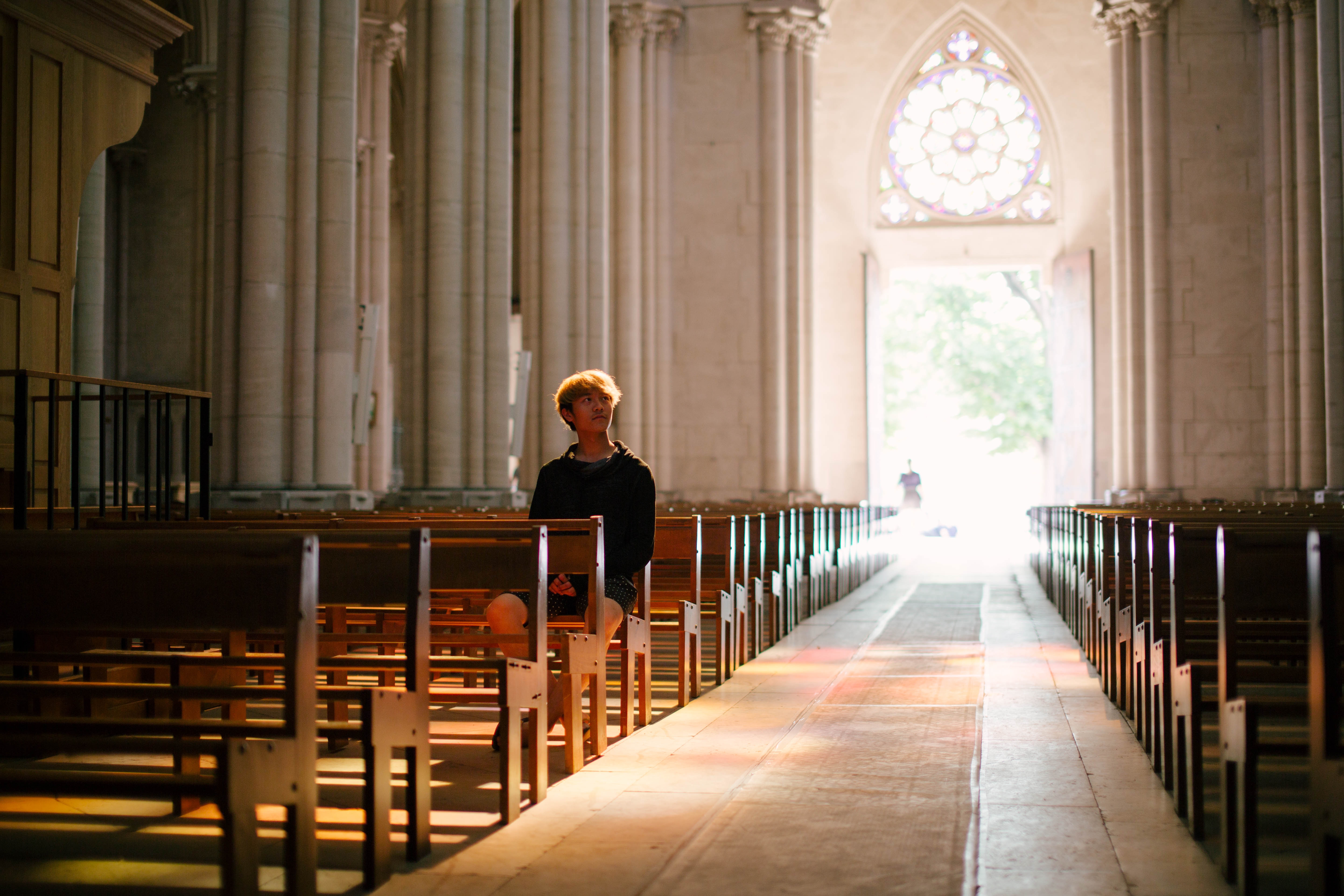“Let the exhilarating shock of the resurrection itself continue—the great reversal, the death of death, the shattered door, the harrowing of hell, the beautiful metamorphosis, the explosion of life! No metaphor measures up, no superlative suffices…. The spirit of… Eastertide is celebratory, joyful… one long feast!” (Bobby Gross)
Friends, we are several weeks into Eastertide and next week we celebrate the Ascension and then in ten days Pentecost, the fiftieth day of Easter! We are still right in the middle of the story of the Resurrection of Christ. I love these words of the author Bobby Gross – but I have to confess I’ve been much more taken up these days by the dust and ashes of Lent. By that I mean I am painfully aware in this life I live, of all that is in me that does not shout of the shattered door. My body aches, my sins are a plague… Yet in spite of this I love these words – I love the reality that whether we sense it or not – The Resurrection matters!
I’ve had this great desire for many years to comprehend the formative nature of Eastertide. As an evangelical my life has been shaped and transformed by the Cross. I have experienced over and over its transformative nature. There is a quote I’ve used before – “Heaven is not only Christ centered; it is Cross-centered” (C.J. Mahaney).
I admit however, that for so many years the place the Resurrection of Christ has in Christian formation has eluded me. The apostle Paul is beginning to change that for me, because for him there is no power in the Cross without the Resurrection. He has taken these events (and others -like baptism…) and made them essential parts of our formation in Christ. You can’t escape thoughts like these found in Ephesians:
4 But God, being rich in mercy, because of the great love with which he loved us, 5 even when we were dead in our trespasses, made us alive together with Christ–by grace you have been saved– 6 and raised us up with him and seated us with him in the heavenly places in Christ Jesus…
Ephesians 2:4-6
But if you could, what would you do about Colossians 3 or Romans 6 or 2 Corinthians 4 or Galatians 2! I have grown to love and respect Paul like I never have before. What would we do without him? What if he had never responded to the Risen Christ? (Acts 9)
If the Crucifixion is a sobering time for us, Easter then has become a place to know and experience great joy. J.R.R. Tolkien coined a wonderful word for this sudden eruption of joy – eucatastrophe!
Eucatastrophe – the sudden happy turn in a story which pierces you with a joy that brings tears…
J.R.R. Tolkien
“I coined the word ‘eucatastrophe’: the sudden happy turn in a story which pierces you with a joy that brings tears (which I argued it is the highest function of fairy-stories to produce). And I was there led to the view that it produces its peculiar effect because it is a sudden glimpse of Truth, your whole nature chained in material cause and effect, the chain of death, feels a sudden relief as if a major limb out of joint had suddenly snapped back. It perceives – if the story has literary ‘truth’ on the second plane (….) – that this is indeed how things really do work in the Great World for which our nature is made. And I concluded by saying that the Resurrection was the greatest ‘eucatastrophe’ possible in the greatest Fairy Story – and produces that essential emotion: Christian joy which produces tears because it is qualitatively so like sorrow, because it comes from those places where Joy and Sorrow are at one, reconciled, as selfishness and altruism are lost in Love.” (Tolkien)
… An event that catches in our throat, makes our hearts beat faster, makes the longing for home go deeper – this is the kind of joy Easter brings.
And yet… we know all too well, the already/not yet reality of our lives. We sin, we suffer, we grieve. We know loss, and temptation, and mistakes, and guilt. This continues long after Easter.
How do we then hold onto that joy? That profound grasp of eucatastrophe?
I think we do it in two ways – the first takes us back to our baptisms…
“The physical movement of baptism, down into the water and up again, becomes for Paul the shape of Christian living as our old life ‘in the flesh’ dies in the death of Jesus, and our new life ‘in the Spirit’ begins in the resurrection of Jesus”
Ian Paul
For Paul, and therefore for us, there is no separating of the Cross from the Resurrection – they are two sides of the same coin, two parts of the one experience. And because of what the Father has done in Christ – making him to be sin who knew no sin, for our sake, so that in him we might become the righteousness of God. (2Co 5:21) we can live the full life we’ve been given in Christ! So the rhythm of baptism becomes the rhythm of our lives, of confession, of Communion… we confess and turn, we take our place in His death; we receive His forgiveness and grace, and we rise to take our place in His rising, in His resurrection!
And the second way we hold onto that joy is through the virtue of hope. The writer of Hebrews calls hope “a sure and steadfast anchor of our souls…” (Heb. 6:19). Hope is a resurrection virtue.
I wrote in an earlier post that holding onto biblical hope would help us to understand that the life we live, is a pilgrimage. “We may indeed never see in this life the fulfillment of our hopes or dreams. But living life as an “on the way” kind of people sets into our hearts a contentment and peace that our future rests in the hands of God. The Israelites’ journey through the wilderness reminds us of the peril of not trusting in God. Do you know that they wondered for 40 years over a span of only 240 miles?” (me from an earlier post)
I hold to this idea that while hope is indeed a pilgrimage virtue, the Resurrection changes everything! We can now see that hope’s anchor, hope’s place in us, means that the journey of our becoming now directs us to the resurrection to come!
1 Peter 1:3-5 3 Blessed be the God and Father of our Lord Jesus Christ! By his great mercy he gave us new birth into a living hope through the resurrection of Jesus Christ from the dead, 4 that is, into an inheritance imperishable, undefiled, and unfading. It is reserved in heaven for you, 5 who by God’s power are protected through faith for a salvation ready to be revealed in the last time.
I struggle now with a body that at times feels like my enemy. I struggle with finding answers to chronic ailments. I struggle now with “besetting” sins (I just might have to give up driving…). But every day, I can rise and pledge that through the power of the indwelling Spirit, I can walk through this day in the rhythm of baptism. And that makes each day a eucatastrophe! I can lift my eyes from my bed in the second (or more) days of a migraine – and hope. And that hope is not weak, insipid, or illusory. I am still very cranky over my ailments, but the hope I can rest on is the hope Peter speaks of in the passage above – “an inheritance imperishable, undefiled, and unfading…” But wow, do I need the power of Christ in me- the hope of glory (Col. 1:27).
I think what I’m trying to say is that our joy, our hope, our lives are not restricted to the broken, fallen world we live in. Paul says “We want you to know, brothers, about the grace of God that has been given among the churches of Macedonia, “for… in a severe test of affliction, their abundance of joy and their extreme poverty have overflowed in a wealth of generosity on their part. (2Co 8:1-2 ESV)
I kinda want to have a eucatastrophe party! Let’s write a resurrection liturgy! I want to be like those two disciples who left Emmaus immediately after Jesus revealed himself to them – They ran back to Jerusalem! Can you imagine their talk on the way?? “did you…? Can you believe…? What does this mean…? I want to be a part of a people who don’t forget what we’ve been given in the resurrection of Christ and what we will receive in the “final resurrection to come.”
I wrote a poem – well maybe it’s a poem, I’m no expert. I found this random line from a website- “I meant to give thanks.” I don’t even remember the content I was looking for. But it lingered in my mind for several days and from it came this poem. I forget, too often, that our lives are filled with complexities and contradictions.
I meant to give thanks…
For the day and for the night,
For the joy and the longing,
For the journey and for the end.
I meant to give thanks…
For the dying and for the rising,
For the dust and for the glory,
For the scars and for the life.
I meant to give thanks…
For the lament and for the hope,
For the wood and for home,
For the Prodigal, both Father and Son.
And so, on this day, in this evening prayer,
I pause, and remember what I’ve forgotten,
and give Him thanks.
All my thanks I pledge to You,
my God and my Lord.
Once again, friends, Let’s shout “Christ is risen! He is risen indeed!”





